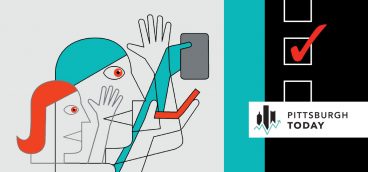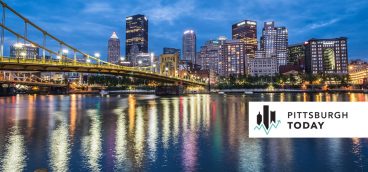Pandemic Widens Pittsburgh’s Digital Divide

In Pittsburgh and across the nation, the coronavirus pandemic has isolated residents in their homes and shifted huge swaths of public life to the digital world that 1 in 10 people in southwestern Pennsylvania are left out of.
Closing longstanding gaps in access to the Internet has taken on new urgency as employers, educators, doctors and others turn to digital strategies during the pandemic to replace what routinely had been done in person.
“The presence of this digital divide has become extremely clear,” said Adie Tomer, head of the Metropolitan Infrastructure Initiative at the Brookings Institution. “It’s ever-present.”
Pittsburgh lags
According to 2018 data from The American Community survey, 87.1 percent of the total households in the seven-county Pittsburgh Metropolitan Statistical Area had a broadband Internet subscription.
That ranks the Pittsburgh MSA in the bottom half of the 16 Pittsburgh Today benchmark regions, just below Philadelphia, where 87.6 percent of residents have a broadband subscription. Cleveland had the lowest rank at 84.9 percent.
In Seattle, 92.7 percent of households had broadband subscriptions. In Boston, 90.9 percent had broadband connections, the second-best rate, followed by Denver at 90.7 percent.
In Pittsburgh, and elsewhere, minority and low-income communities tend to have significantly lower broadband subscription rates than the wider population.
African American households in the Pittsburgh MSA had a broadband subscription rate of 78.4 compared to 87.5 percent among white households, 2018 census data suggest. Among households making less than $20,000 per year, only 62.9 percent of had a broadband subscription in the Pittsburgh region.
“There’s a significant discrepancy between the haves and the have-nots,” said Adam Longwill, executive director of the Pittsburgh-based non-profit Meta Mesh Wireless Communities. In many of the region’s underserved communities, now-shuttered institutions like schools, libraries and community centers were the primary source of internet access for many residents.
The Pittsburgh Public School District estimates that 1,000 families in the system lack high-speed internet access at home, approximately 9 percent of the total student body. In 2016, The Carnegie Library system reported that patrons had used 48 million minutes of Wi-Fi, an increase of 26 percent over the previous year.
“We’re broadening the digital divide right now,” Longwill said.
Over the last decade, a number of local government organizations and nonprofits, including Meta Mesh Wireless Communities, the Carnegie Library system and the City Department of Innovation and Performance, have worked to address the divide by creating free mesh networks in underserved areas of the region.
Mesh networks rely on simple Wi-Fi set-ups to push existing broadband signals into nearby public spaces. Longwill’s previous clients include the borough of Sharpsburg and The Braddock Public Library, and Meta Mesh Wireless Communities recently partnered with Carnegie Mellon University researches to provide free Internet access to areas of the Pittsburgh region where students face high rates of digital exclusion.
The pilot program will launch in Coraopolis, with projects in Homewood and New Kensington to follow.
Rethinking broadband
As the nation struggles to bridge gaps in Internet access in the face of a long pandemic, a growing chorus of experts and lawmakers are calling for a rethinking of the current Internet economy.
“We need to get to a place where we consider broadband a utility, both intellectually and structurally,” said Tomer. “Digital infrastructure, in particular broadband, is essential. It is a utility that should be partnered alongside water and electricity.”
U.S. Representative Mike Doyle (D-Allegheny), chair of the influential Subcommittee on Communications and Technology, said money and policies aimed at expanding access to affordable broadband will be a “key piece” of any post-corona infrastructure legislation produced by the House of Representatives.
“This pandemic has demonstrated in very stark terms that access to the Internet isn’t a luxury, it’s a necessity,” he said.
But any infrastructure bill would likely come after Congress is convinced the virus and its immediate economic fallout have been contained. “That infrastructure bill is coming at the end of the line, not next up,” Doyle said.





